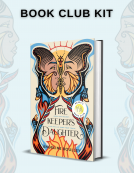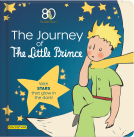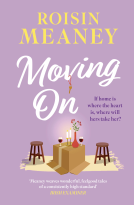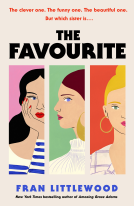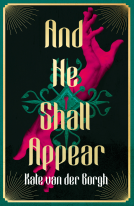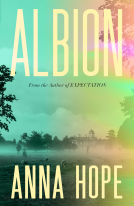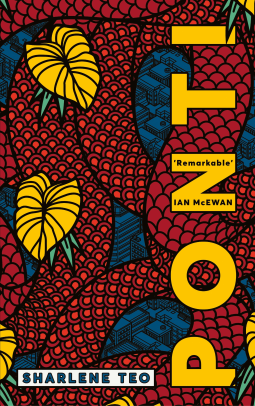
Ponti
by Sharlene Teo
This title was previously available on NetGalley and is now archived.
Send NetGalley books directly to your Kindle or Kindle app
1
To read on a Kindle or Kindle app, please add kindle@netgalley.com as an approved email address to receive files in your Amazon account. Click here for step-by-step instructions.
2
Also find your Kindle email address within your Amazon account, and enter it here.
Pub Date 19 Apr 2018 | Archive Date 30 Jun 2018
Pan Macmillan | Picador
Talking about this book? Use #Ponti #NetGalley. More hashtag tips!
Description
2003, Singapore. Friendless and fatherless, sixteen-year-old Szu lives in the shadow of her mother Amisa, once a beautiful actress and now a hack medium performing séances with her sister in a rusty house. When Szu meets the privileged, acid-tongued Circe, an unlikely encounter develops into an intense friendship and offers Szu a means of escape from her mother's alarming solitariness.
Seventeen years later, Circe is struggling through a divorce in fraught and ever-changing Singapore when a project comes up at work: a remake of the cult seventies horror film series 'Ponti', the very project that defined Amisa's short-lived film career. Suddenly Circe is knocked off balance: by memories of the two women she once knew, by guilt, and by a past that threatens her conscience.
Told from the perspectives of all three women, Ponti is about friendship and memory, about the things we do when we're on the cusp of adulthood that haunt us years later. Beautifully written by debut author Sharlene Teo, and enormously atmospheric, Ponti marks the launch of an exciting new literary voice in the vein of Zadie Smith.
Advance Praise
'Remarkable . . . With brilliant descriptive power and human warmth, Sharlene Teo summons the darker currents of modernity – environmental degradation, the suffocating allure of the sparkling modern city and its cataracts of commodities and corrupted language. Against this, her characters glow with life and humour and minutely observed desperation' - Ian McEwan
Available Editions
| EDITION | Other Format |
| ISBN | 9781509855315 |
| PRICE | £14.99 (GBP) |
| PAGES | 304 |
Featured Reviews
 Book Trade Professional 203540
Book Trade Professional 203540
This is a lively read - strong characters bring the story of a faded z-lost actress to life. But first and foremost, I have to praise the cover design. I try not to judge a book by its cover, but this bold and bright best stuck in my head and made me read.
 Alexis H, Reviewer
Alexis H, Reviewer
I loved this book so, so, much. Sharlene Teo is my new favourite author and I urge everyone in the world ever to read this, her debut novel. Her writing is amazing, she is so clever and funny. She is just extremely sharp-witted and all her characters are like wonderful caricatures with such colourful personalities.
This book is based around three characters: Szu, her mother and her best friend. All the characters tell their stories from different times; their timelines do not overlap but they are all relevant to one another and come together into one big picture. Szu is in the present; her mother Amisa is in the past when she was a young girl and growing into a woman and mother, and her best friend Circe is in the future when she has grown older and is looking back to the past. Szu's mother was once an actress in a B movie: "Ponti!" Although it was a complete flop and nobody has ever even seen it, Amisa is forever a bitter and proud superstar.
All three of these characters are funny and sad. They each have their own unique problems and ultimately they are similar in many ways, but the author does a really good job of differentiating their voices and personalities so it is never confusing or dull. They all have interesting and unusual relationships with each other. The characters have love for one another in strange ways, and I love the way they interact incredibly awkwardly and think weird, crazy things - ultimately just like real people.
My favourite character is Szu. She is so awkward and I can relate to her so much, I guess because she feels like she has nobody to talk to and her mother is such a huge presence that she feels completely overshadowed by the ever present memory of her mother's stardom. And, of course, she is not beautiful and graceful like her mother is, and that is such a disappointment to everyone, especially Szu.
Ultimately, this book is about awkwardness and ageing, family and friendship, success and failure. If you have ever been human, there is something you can appreciate in this book. The writing is amazing (have I said that already?) and just makes it so special and enjoyable to read. This is my new favourite book of all time and I would give it 6 stars if I could.
 Ali T, Reviewer
Ali T, Reviewer
A coming-of-age novel set against the relentless modernisation of Singapore, where air pollution is measured daily and reeks of rotten eggs, or burnt barbecue.
In Ponti, men are largely absent or feckless. This is a novel about three women and told in three time perspectives. In the early 2000s Szu is sixteen, tall, awkward and ostracised by everyone; even her own mother is a monster who rejects her. She eventually finds a friend in Circe, another loner who is equally unpopular. There are brilliant descriptions of the 'mean' girls, the in-groups who tease and bully Szu and Circe: They are as idle and cunning as crocodiles ... Every morning, in unison, they twist their shampoo-advert hair gently in their hands and draw it over their shoulder like a rifle sling.
As well as a monster for a mother, Szu is also coming to terms with a missing father, and the knowledge that now her mother is dying, she'll never gain her affection or approval. She'll be left with only the mysterious Aunt Yunxi who works as a medium, with Amisa as her assistant.
In the 70s Amisa, young, poor and impossibly beautiful, is spotted by a film director and promised international stardom: Her face would grace billboards in Hong Kong, Paris, Hollywood ... she would be immortal. She makes a series of three shlock horror films starting with Ponti! about the Pontianak, a vampire-like monster who lures men to their deaths with her ethereal beauty. But when the films are released, horror is unfashionable; everyone wants American sci-fi movies like Close Encounters. The films are a flop. Amisa never hits the big time and her short film career defines the rest of her life.
In 2020 Circe, estranged from Szu, is working for a cutting edge media company promoting a reworking of Ponti for a contemporary audience. But she's living with a medical condition more typical of developing countries - a tapeworm that she feels moving inside her, symbolising the monster she feels she is and the guilt that she was disloyal to Szu when her mother died. Circe also felt the strange mystical bond with Amisa - What linked us was something real and true and rare. Szu wouldn't understand.
Writing in the Observer, Julie Myerson was damning about Teo's knotty verbiage and MA creative writing-speak; while I think she's heavy handed in her criticism, she does have a point about the language; but only on a very few occasions.
Overall this ambitious debut novel is a success - it took me back to the sometimes gruesomeness of life as an angsty adolescent. Painfully sad but sometimes humorous, Ponti is an eye-opening read about the effects of rapid modernisation on a developing country and the people who have to live with the consequences.
 Reviewer 333367
Reviewer 333367
I was really struck by the sense of place in this book. Having read it, I feel like I’ve been to Singapore, and that I could tell you what it feels like and looks like and smells like. I also loved the way the author was able to create the strange, push/pull feeling that is so particular to teenage friendships. At times the level of description was a bit overwhelming for me, but generally I loved the details that Teo chose to pick up and linger on. She doesn’t hide or gloss over any uncomfortable details, which I found refreshing. Reading this book was a truly sensory experience.

